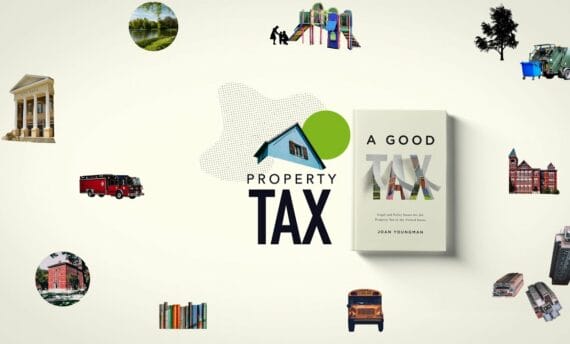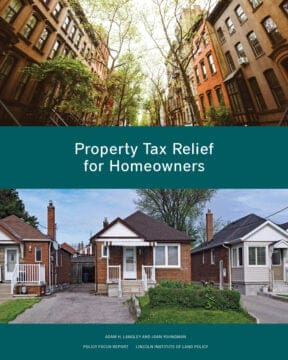Podemos rastrear los orígenes del Instituto Lincoln hasta un encuentro fortuito entre un inventor de Cleveland, un industrialista y un arrollador economista político en la década de 1890. John C. Lincoln, un ingeniero que inventó las soldadoras de arco, los motores eléctricos de alto torque, los sistemas de freno para tranvías, e incluso un auto eléctrico, se vio movilizado por el relato apasionado de Henry George sobre la terquedad de la pobreza urbana de cara a la riqueza sin precedentes generada por la Revolución Industrial. Así fue que Lincoln dedicó años de su vida, y gran parte de su fortuna, a fomentar las ideas de George para la mejora social.
George demostró de forma persuasiva y convincente que la pobreza era el resultado de injusticias en términos de distribución. El crecimiento económico estaba beneficiando a las personas indebidas. Los propietarios holgazanes podían sentarse a mirar cómo el valor de sus tierras crecía de forma exponencial, mientras que, a la clase productiva, tanto a la mano de obra como al sector del capital, se le imponían impuestos para apoyar al gobierno. George propuso reemplazar los impuestos a los ingresos y las empresas por un nuevo impuesto que expropiaba la plusvalía del suelo de sus propietarios. Calculó que la renta generada por impuestos territoriales sería suficiente para eliminar la pobreza y para financiar al gobierno.
Dada su propia inclinación hacia la justicia social, la ética, la eficiencia y la imparcialidad básica, a John Lincoln esta disposición le resonó. Pero el fracaso de las propuestas de políticas de George para obtener algún tipo de adhesión política lo desconcertó. Una razón que pudo observar fue que el análisis y las conclusiones de George no recibieron una aceptación académica general. Francamente, excepto por un puñado de universidades como Columbia, UC–Berkeley o la Universidad de Chicago, el trabajo de George se marginalizó, si es que se enseñó. Nunca se consideró como un componente troncal de la formación de economistas o politólogos. Para remediar esto, Lincoln decidió crear la Fundación Lincoln y asociarse con universidades para establecer programas sobre economía de suelo y tributación. Y eso es lo que la Fundación Lincoln hizo desde 1946 hasta 1974.
En 1974, el hijo de John, David C. Lincoln, examinó detenidamente el impacto de los esfuerzos de la fundación por difundir la economía del suelo y la tributación en los ámbitos de la economía y las ciencias políticas. Fue una gran decepción. Los programas respaldados con los recursos de la fundación eran efímeros y la economía del suelo seguía siendo una especialización en unas pocas universidades. Decidió intentar un abordaje nuevo y estableció el Instituto Lincoln de Políticas de Suelo para poner la investigación y formación bajo nuestra propia ala. Y David dejó bien en claro algo que repetía a menudo: “El trabajo de Henry George no se trataba de fomentar los impuestos territoriales, sino de eliminar la pobreza”. Por lo tanto, el Instituto Lincoln se fundó sobre la noción de que la política de suelo no era un fin, sino un medio para solucionar desafíos ambientales, sociales y económicos de mayor envergadura.
Con tal claridad, lo que siguió tuvo efectos cuantificables de inmediato. En la década de 1980, la llegada del abogado y conservacionista de Boston, Kingsbury Browne, como integrante del Instituto Lincoln provocó la creación de una red nacional de conservación del suelo privado que se expandió por todo el territorio de los Estados Unidos. Hoy en día, los miembros de la Land Trust Alliance, una organización que evolucionó a partir del trabajo de Browne, han protegido más de 23 millones de hectáreas de suelo privado a perpetuidad en los Estados Unidos. En la década de 1990, el Instituto Lincoln inventó un avalúo masivo asistido por computadora. Ahora, los gobiernos locales de todas partes usan los sistemas construidos sobre dicho legado. En la década del 2000, nuevos programas internacionales de América Latina respaldaron, evaluaron y documentaron modernas herramientas y técnicas de recuperación de plusvalías del suelo. Decenas de países y miles de jurisdicciones hoy están estudiando formas de usar estas herramientas para movilizar su propia renta pública. En la década de 2010, el Instituto Lincoln se globalizó, y estableció una Red Internacional de Conservación del Suelo para promover la conservación del suelo privado y compartir nuestro trabajo a escala global en lugares como Habitat III.
Este es un punto importante (y sé que demoré en llegar al grano): logramos décadas de trabajo significativo a pesar de que no podíamos definir con facilidad la disciplina en la que operamos. Durante los últimos años, intentamos rectificar eso. Esta primavera, la junta y la gerencia del Instituto Lincoln intentaron definir con eficacia el concepto de política de suelo. Con “eficacia”, quiero decir claridad, fácil comprensión y eficiencia. La tarea nos resultó tan abrumadora que incluso le pedimos ayuda a la inteligencia artificial. En la columna que escribí en abril, compartí nuestros desafíos y les pedí ayuda. Les pedí que enviaran sus mejores definiciones de política de suelo y ofrecí un premio.
Me complace informar que recibimos muchas respuestas de todo tipo, desde artísticas hasta teológicas. Llegaron desde cuatro continentes, y la más lejana fue de Nueva Zelanda. Provinieron, sobre todo, de personas individuales, pero también hubo un esfuerzo grupal de una red de 40 profesionales de América Latina. Su extensión varió de 12 a 548 palabras. Yo mismo envié mi propia definición. Si le interesa leerlas a todas, las encontrará en www.lincolninst.edu/land-policy-reader-submissions.
Si bien los miembros del jurado quedaron muy sorprendidos con el alcance y la creatividad de las respuestas, temo que tengo noticias desalentadoras para quienes sean luditas: consideraron que no superamos al bot de la inteligencia artificial (IA). A modo de recordatorio, esta es la definición de 85 palabras que nos ofreció ChatGPT:
Las políticas de suelo se refieren a las normas y regulaciones que rigen el uso, la propiedad y la gestión del suelo. Implican una toma de decisiones sobre cómo debe utilizarse el suelo, quién debe tener acceso a él y qué actividades se permiten en él. Las políticas de suelo pueden concernir una amplia gama de temas, desde la urbanización y la conservación medioambiental hasta los derechos de propiedad y la equidad social. Su objetivo es equilibrar los intereses de diferentes partes interesadas y garantizar que el suelo se utilice de maneras que beneficien a toda la sociedad.
Eso no significa, sin embargo, que no se merezcan elogios. A la vista de los miembros del jurado, la mejor respuesta fue la de Harvey Jacobs:
La política de suelo consiste en reglas, la cultura que subyace a dichas reglas y las expectativas sociales respecto del uso del suelo. Reúne al gobierno, el mercado y los actores privados. Tiene resultados formales e informales. Los resultados formales suelen ser planes, regulaciones y programas. Los resultados informales suelen ser patrones socialmente aceptados relacionados con el modo en que se debe utilizar el suelo y nuestro comportamiento respecto al suelo.
La respuesta más ahorrativa fue un haiku escrito por PD Blumenthal:
Usar, controlar, compartir suelo
Proteger la tierra, el agua y el aire
Para beneficiarnos todos
Y la respuesta más creativa fue un poema titulado A More Stealthy Georgist Cat (Un gato georgista más sigiloso), de David Harold Chester. Es muy largo para republicarlo aquí, pero puede verse en www.lincolninst.edu/land-policy-reader-submissions.
La respuesta más concisa fue la de Ben Brown:
La política de suelo es un conjunto de reglas a través de las que el gobierno formaliza el pensamiento ilusorio de responder a demandas enfrentadas de uso del suelo en un futuro que es inevitable e incierto.
A pesar de que no superamos a la inteligencia artificial, estoy muy feliz con el resultado del ejercicio. Confirma un par de cuestiones importantes. Primero, la política de suelo tiene un alcance amplio, y toca muchos aspectos de la vida. Viéndolo así, quizás está bien que eluda definiciones sencillas. Segundo, es posible pasar años haciendo algo que no se puede explicar con facilidad. Supongo que los expertos en políticas de suelo no son las únicas personas que no pueden explicar en reuniones familiares lo que hacen exactamente.
Se me ocurre que el problema puede ser taxonómico. En la taxonomía, puede ser más difícil definir una clasificación que dar un ejemplo de algo que está dentro de esa clasificación. En lo que a mi vida respecta, jamás puedo recordar las diferencias entre clase, orden, familia, género o especie, pero bajo presión puedo dar un ejemplo de cada término.
Al final, les voy a dar a todas las personas que participaron en la competencia un libro de su elección de nuestra impresionante biblioteca de publicaciones sobre políticas de suelo que está en constante expansión. Además, a cada uno de los autores de las cuatro respuestas distinguidas arriba les regalaré cinco libros de su elección.
Fue un ejercicio maravilloso y apreciamos el pensamiento y la creatividad puestos en todas las entregas. Valoramos aún más su cooperación como cuerpo colegiado y nos sentimos honrados de compartir este esfuerzo difícil de definir con todos ustedes. Lo que comenzó con un encuentro casual entre un arrollador reformador y un inventor más de un siglo atrás tiene incluso más relevancia hoy en día: encontrar respuestas en el suelo para mejorar la calidad de vida.
Crédito: Devonyu vía iStock/Getty Images Plus.









 This course examines the deep problems of the Massachusetts property tax in the 1970s and the subsequent reforms that created one of the most functional and fair systems in the United States.
This course examines the deep problems of the Massachusetts property tax in the 1970s and the subsequent reforms that created one of the most functional and fair systems in the United States. This online self-paced course provides an overview of how local governments in the U.S. raise and spend money for the public services and infrastructure that are foundational to a high quality of life.
This online self-paced course provides an overview of how local governments in the U.S. raise and spend money for the public services and infrastructure that are foundational to a high quality of life.